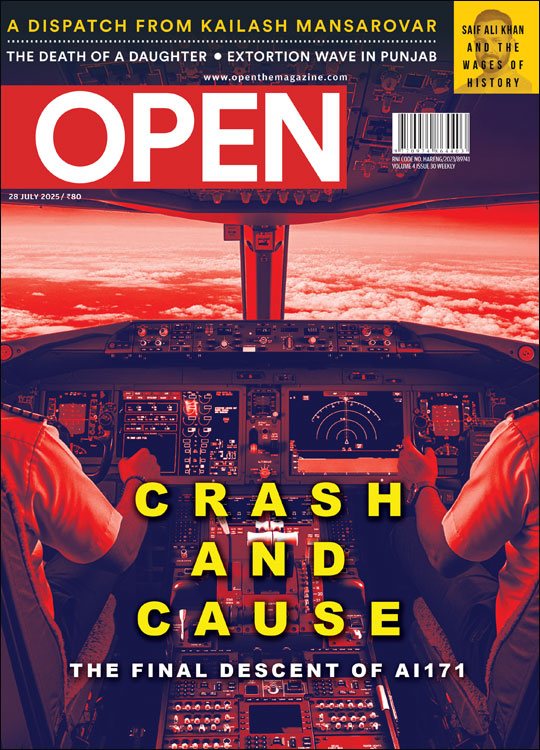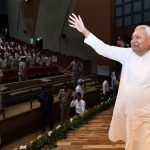Kailash Katkar, 50, Founder, Quick Heal
‘I look for what is going to come next and prepare myself for that,’ says Kailash Katkar
 Madhavankutty Pillai
Madhavankutty Pillai
 Madhavankutty Pillai
Madhavankutty Pillai
 |
12 Oct, 2017
|
12 Oct, 2017
/wp-content/uploads/2017/10/KailashKatkar1.jpg)
The morning of the day I am to meet Kailash Katkar, the founder and CEO of Quick Heal Technologies Ltd at its headquarters in Pune, I chance upon the Times of India business page and see a headline: ‘Cyber Security Company Unearths Huge Data Breach’. The article refers to Seqrite Cyber Intelligence Labs, the enterprise security wing of Quick Heal, tracking an advertisement on the Dark Net that offered access to 6,000 email IDs, internet protocol information, servers and databases of public and private companies. The hacker wanted Rs 42 lakh worth of Bitcoins in return when Seqrite’s team got in touch to investigate. The lab was started by Katkar one-and-a-half years ago, and later in the afternoon, he would tell me that it is the only one of its kind in India, the primary focus of its 40 personnel being the Dark Net and looking for breaches there. “In this Dark Net world, you get to see so many threats that will be the future problems in the market and you should come out with some solution or product for that. It is always good to know what is happening in this industry,” he says. Quick Heal is a Rs 1,300-crore market cap company with 1,200 employees and a presence both in India and abroad. There wouldn’t be anything extraordinary about the venture if not for the CEO himself. Katkar, who founded it two decades ago, is someone who dropped out of school after failing in ninth standard. He does not know any coding but despite that, managed to create one of the best-known anti-virus brands in the country.
The genesis of how that happened has much to do with Katkar’s father, who worked as a machine setter with Philips India in Pune. The family lived in a small house in a slum area. He understood the necessity for his children to have a good education and even though it was difficult financially, enrolled all of them in English-medium schools. “He himself was seventh pass. He used to work overtime to run the house. I was not good in studies because everything was in English. Even after going to seventh and eighth standard, I was not able to speak proper English. There used to always be red lines in my report card. The teachers kept scolding me, my mother and father were scolding me. In the ninth standard, I failed and decided to leave school,” he says.
But he had not been wasting his time. A few years before that, he had started to earn by doing jobs like screen printing and radio repairing. A contractor for Philips India’s uniforms had mentioned to his father the difficulty in finding a screen printer for the company label that needed to be put on the dress. His father, who had no experience of it, offered to take on the contract. A screen printing block had to be made but he didn’t know how. “He and I used to go to a lot of paint shops and keep on asking. They used to give us bits and pieces of knowledge. I did a lot of trial-and-error and one day I succeeded in creating the block. After that I started doing screen printing,” says Katkar. Radio repairing too was due to his father who, since Philips manufactured radios, knew it and passed on the knowledge to his son. “I didn’t get theory knowledge. For that I did a one-month radio repairing course in Pune,” he says.
I sold through channel partners who delayed payment. I couldn’t recover 100 per cent of what was sold
By the time he dropped out of school, Katkar was already making Rs 1,200-Rs 1,300 a month, a big amount in those days. His teachers convinced him to give his matriculation exam externally and, in 1986, while he was waiting for the results, he saw a small advertisement in a newspaper of a company called Data Star that wanted to hire calculator technicians for its Pune workshop. Katkar applied and was called for the interview. At the venue he saw 20 to 25 applicants, all older than him. “Only my interview took around 40 to 45 minutes. I told them I was doing all this repairing work. They kept asking me questions and I kept answering. They asked me to draw an amplifier and started saying, ‘If this component is removed from here, what will happen?’ Whatever I could tell from my judgment, I did. I was the only one person who got selected,” he says.
Katkar’s first salary was Rs 350, much less than what he was earning then. And the company also made him sign a bond that he wouldn’t do other work at home. They sent him to Mumbai for training and on return, he saw there were three other people in the workshop; each of them dealing with large mechanical equipment like facet machines and ledger posting machines. He was the only one servicing electronics by way of calculators. Katkar would get five to six calculators a day and finish them within 90 minutes. He used the additional time for the mechanical machines. “I used to help the other three. I learnt all those machines in three to four months,” he says. His boss used to come from Mumbai once a month. During one such trip, he told Katkar that since he had time to spare, he should also do the accounting. “I said, ‘I don’t know accounting.’ He stayed for two days and taught me everything: debit, credit, petty cash, cash flow, bank transactions, invoicing, quotations,” he says.
Katkar remained there for four years and, in 1990, decided to leave. At the same time, the company decided to close its Pune workshop. He went to his boss and asked for the workshop. “My boss agreed but said, ‘You won’t get it free of cost, you will have to pay for it.’ I said, ‘I will pay from my earnings’ since I didn’t have any capital. He said, ‘okay.’ It was a big amount for me at the time. He transferred everything, all customers, to me,” says Katkar.
This was his first business venture. He kept one office boy and moved on the field. Even when he was with Data Star, he had seen the advent of computers making these machines irrelevant. Most of the customers were banks and they were being computerised. Katkar decided to start learning about them. He went to Mumbai and bought books on how to repair computers. “Understanding how to repair and maintain computers was easier because the machines [that I had worked with] were more complicated,” he says. He added computers to the services he offered.
He wanted annual maintenance contracts (AMCs) from companies, but no one was ready for that. Katkar would go once a week on rounds for potential customers. One was to the Times of India office. Once, Katkar saw three discarded printers lying in a small room there. He was told that they cannot be repaired. He offered to try to do it and in half a day, got all of them working. The head office was informed and asked to pay Katkar. “I said, ‘I don’t want money, I want an AMC for your computers.’ They said they could not give that. I said, ‘Then forget it, I don’t want money.’ They kept approaching me to send my bill. One day they called and said, ‘The accounts department has seven to eight computers and we can give you three under an AMC.’ With the help of that contract, within three days I was able to sign on 25 computers of New India Insurance. Many customers started coming on board from then on,” he says.
IN 1992, KATKAR’S computer maintenance business had just got a footing when his younger brother, Sanjay, who is today the joint managing director and chief technology officer of Quick Heal, told him about his plans to get into an electronics engineering course. Katkar dissuaded him and suggested he do computer engineering instead. It was a new field and the college he had enrolled in was startingits first batch, but his brother was uncertain. “He said, ‘We haven’t seen any computer engineers yet; what would be the future?’ And, ‘It is costly, the annual fees is Rs 5,000.’ I told him I would give him the money. I was insistent because I knew computers would be big and there would be demand for engineers in the industry,” Katkar says.
In Sanjay’s college, there were just a handful of computers and students didn’t get much time on them. Katkar offered him access to a computer in his office and his brother began to come with some friends and practice. At the time, Katkar was facing a problem with his computers. While printing, a line would appear, but the next would be blank and so on. He had thought it was a hardware problem but, despite tinkering, was unable to fix it. When he showed it to his brother, Sanjay said it was a software issue and took the keyboard and showed him a line of binary numbers. “He said, ‘This is the virus [responsible for it].’ He removed [the intrusion] and put the numbers that were supposed to be there and everything was fine. That was when I realised that such software problems also existed,” says Katkar.
Knowledge and skill don’t bring passion, only attitude does. And attitude is based on what you want in life
Sanjay was looking for a college project and Katkar asked him to do it on tools to remove viruses. Virus attacks weren’t that many those days. “For every virus, he created a separate tool, which I started using in the marketplace for my customers. I used to distribute it free of cost. Many like me, who were into computer repairing, started using them,” says Katkar. Unlike other anti-virus products at the time, which detected multiple infections, these tools only worked on one virus at a time. But they were more effective in removing it.
Katkar then asked Sanjay to develop an anti-virus software and as an inducement, gave him a computer at home. “He started working late nights around five to six hours. After one-and-a-half years, he came out with the first version of the anti-virus software and we named it Quick Heal. It only had basic features but was more powerful than other anti-virus programmes in the market,” he says.
Katkar still had to get people to buy it. He appointed a few salespeople but they couldn’t sell a single copy. He then started working the market himself and one by one, they started getting customers. Most were small offices since computers were still not in demand in homes. Their product was priced at Rs 500, while other anti-viruses cost much more than that. But more than price, the USP was its utility. Many of his existing clients like Times of India were already using other brands. But they used Quick Heal as an addition because it was good at removing a virus while keeping files intact. “Most of the customers started doing the same thing—for scanning purposes they used other antivirus software, Quick Heal for removing,” he says.
His brother told Katkar that if he wanted software with multiples features that could be benchmarked with other competitors, they would need to hire developers. “He asked for four developers but I agreed to two because they were very costly,” he says. One of factors that helped them gain market share was the sudden arrival of polymorphic viruses like Dir 2 that changed shape on their own. “A lot of anti-virus companies failed to detect or remove this virus. For any new virus, Sanjay would take a day or two to come up with the solution. For Dir 2, it took him 15 days. But our competitors took almost three to four months. A lot of anti-virus companies could not cope with these viruses and gradually shut down,” he says.
Katkar saw that the software side of the business was booming and was generating more business than the hardware maintenance part. He decided to give his full attention to anti-virus sales and close the other business. It was a decision that would lead him to almost shut down his company.
What Katkar hadn’t factored in were payments coming on time. While computer maintenance had ensured a steady cash flow, when it came to anti-virus sales, it was different. “The software was selling very well but I used to sell through channel partners, dealers and distributors, who always had reasons for delaying payment. That was very difficult for me, like maintaining salaries. Everything became very challenging. I wasn’t able to recover 100 per cent of what was sold,” he says.
He continued to struggle the last few years of the 1990s and, in 2000, was on the verge of shutting shop. Then one of his friends who worked in IBM offered to help. He took a few days off, sat with Katkar and did an analysis of the working of his company. “He came out with a small report, pointing out where I was making the mistake—I was not hiring good, talented senior people in sales; I was managing executives myself. He said, ‘You don’t have that experience to manage such a team; you should have senior people in sales and even in support.’ I decided to place a huge advertisement and got good managers. They started driving the sales and the picture changed,” he says.
The senior managers set out formal terms and conditions for distributors and dealers on payments and made sure that all of it was adhered to. That same month, Katkar started a Nashik branch. From then on, Katkar began to expand across the country and later internationally. Last year, Quick Heal held an IPO and became a publicly listed company.
In Katkar’s cabin, a paper poster has recently been pasted on the wall. On it, his name has been struck out; he wants instead to be addressed as ‘Doc’. It is a humoured reference to an honorary doctorate he received from Chitkara University this July. Katkar did pass his external matriculation examination, even though he hadn’t been expecting it. But he does not see not having higher education as a weakness. What he had was the ability to spot the future. While working on calculators, he could see the computer age. While dealing in hardware, the dominance of software.
“I look for what is going to come next and prepare myself for that. To grab that opportunity and create a business out of it,” he says. “I had only one goal—whatever others of my age and level could do, I should do ten times that.”
Success, he says, is like a triangle with three points: one is knowledge that one acquires, the second is skill or putting that knowledge into practice and the third is attitude which drives skill and knowledge. “Knowledge and skill don’t bring passion, only attitude does,” he says. “And attitude is not based on knowledge and skill, it is based on what you want in life.”
About The Author
CURRENT ISSUE
MOst Popular
3

/wp-content/uploads/2025/07/Cover_Crashcause.jpg)













More Columns
Bihar: On the Road to Progress Open Avenues
The Bihar Model: Balancing Governance, Growth and Inclusion Open Avenues
Caution: Contents May Be Delicious V Shoba